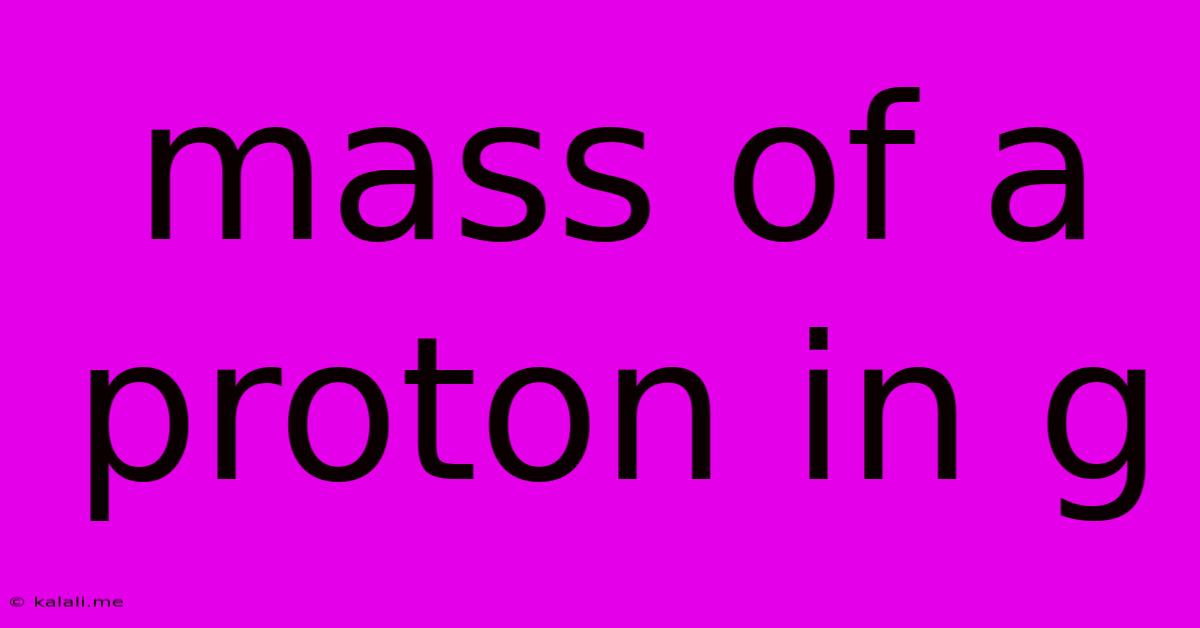Mass Of A Proton In G
Kalali
Jun 13, 2025 · 3 min read

Table of Contents
The Mass of a Proton in Grams: A Deep Dive into Subatomic Physics
The mass of a proton is a fundamental constant in physics, crucial for understanding the behavior of matter at the atomic and subatomic levels. While often expressed in atomic mass units (amu) or MeV/c², its equivalent in grams is essential for connecting the microscopic world to the macroscopic world we experience daily. This article will delve into the mass of a proton in grams, explaining its significance and providing context within the broader field of physics.
The mass of a proton is incredibly small, making it challenging to conceptualize in everyday terms. Understanding this value requires a grasp of scientific notation and the conversion between different units of mass. Let's explore this fascinating aspect of the physical universe.
Understanding the Proton's Mass
The proton, a subatomic particle found in the nucleus of every atom, carries a positive electrical charge. It's one of the building blocks of all matter, along with neutrons and electrons. Its mass is approximately 1.67262 × 10⁻²⁴ grams. This number highlights the incredibly tiny scale we're dealing with – a fraction of a fraction of a gram.
To put it into perspective, consider the following: a single grain of sand contains trillions upon trillions of protons. The collective mass of these protons, alongside neutrons and electrons, adds up to the measurable weight of the sand grain. This stark contrast emphasizes the minuscule mass of an individual proton.
Converting Units: From amu to Grams
The mass of a proton is frequently expressed in atomic mass units (amu), where 1 amu is defined as one-twelfth the mass of a carbon-12 atom. The proton's mass is approximately 1.007276 amu. Converting amu to grams requires knowledge of the conversion factor: 1 amu ≈ 1.66054 × 10⁻²⁴ g.
Therefore, multiplying the proton's mass in amu by this conversion factor yields its mass in grams: 1.007276 amu * 1.66054 × 10⁻²⁴ g/amu ≈ 1.67262 × 10⁻²⁴ g.
The Significance of the Proton's Mass
The proton's mass isn't merely a numerical value; it plays a vital role in various physical phenomena:
-
Nuclear Reactions: Understanding the mass of protons is critical in calculating the energy released or absorbed during nuclear reactions, such as fission and fusion. The famous Einstein equation, E=mc², directly relates mass and energy, demonstrating the profound implications of even small mass changes.
-
Atomic Structure: The proton's mass, in conjunction with the neutron's mass, determines the overall mass of an atom's nucleus, influencing its chemical and physical properties.
-
Particle Physics: The proton's mass is a key parameter in theoretical models of particle physics, such as the Standard Model, which aims to describe the fundamental constituents of matter and their interactions.
-
Cosmology: The mass of protons and other subatomic particles has implications for our understanding of the early universe and the formation of stars and galaxies.
Conclusion: A Tiny Particle with Immense Significance
The mass of a proton in grams, though incredibly small, represents a fundamental constant with far-reaching consequences across multiple branches of physics. Understanding this value is crucial for unraveling the mysteries of the universe at its most basic level. The precision of this measurement and its relevance to broader scientific inquiry underscores the importance of continued research and exploration into the subatomic world. Further research into the intricacies of proton mass will undoubtedly continue to refine our understanding of the universe's fundamental building blocks.
Latest Posts
Latest Posts
-
Difference Between Composite Materials And Alloys
Jun 14, 2025
-
Does University Of Minnesota Require Sat
Jun 14, 2025
-
Whats The Difference Between Shortage And Scarcity
Jun 14, 2025
-
Can I Change My Sat Test Date For Free
Jun 14, 2025
-
Which Of The Following Letters Does Not Suffer Lateral Inversion
Jun 14, 2025
Related Post
Thank you for visiting our website which covers about Mass Of A Proton In G . We hope the information provided has been useful to you. Feel free to contact us if you have any questions or need further assistance. See you next time and don't miss to bookmark.